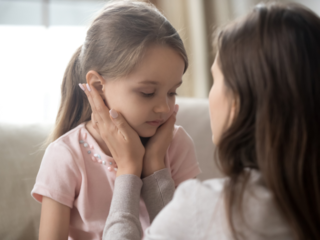Anxiety
How to Address Heavy Topics with Kids
Parenting under fire.
Posted August 1, 2022 Reviewed by Devon Frye

After the recent school shooting in Uvalde, Texas, my 9-year-old daughter who is in fourth grade saw me crying as I read about the children who died. I was faced with the dilemma of how to discuss this horrific event with her. It can be challenging to decide how explicit to be when talking about a terrible event with a young child.
The recent tragedies have left many parents feeling anxious and confused about how to address these heavy topics with their children. As parents, we are expected to have all the answers and provide our children with support, guidance, and security. It is important that we use these opportunities to talk openly and give developmentally appropriate information while instilling family values.
Here are some tips to address heavy topics with children.
- It is essential to be honest with your child and not over-shelter them—and it is equally important to be tactful and use developmentally appropriate language.
- It is understandable to be angry about an event like this, but try to convey your passion without too much negativity. Always find the pearls of wisdom in every story and convey that you are able to handle your own negative emotions. This is being a good role model.
- If you are able to do so calmly, imparting your own beliefs and family values regarding something you are passionate about will benefit your child’s moral development.
- It is not necessary to include graphic details that will only cause more anxiety and fear.
When my daughter walked in on me crying that morning, I did not try to hide the fact that I was deeply affected by the news. Letting her see my sadness teaches appropriate expression of emotions. I left out the fact that the children who died were the same age as her. There were plenty of details that I left out since she did not need to know this information. I was not going to try and express to a 9-year-old child just how fragile life is at 7:30 am as she is getting ready for school.
When it comes to discussing traumatic events with your children, age matters. While they may be too young for some of the super heavy stuff, it is our responsibility as parents to teach family values and morality to our children. My values may be different than yours and we may differ in our views on politics or gun control, etc. But I believe that whatever your values are, it is critical to impart them in a way that is appropriate for your child's age. I created the list below for suggested actions for age groups based on typical development:
3-6 years
- Avoid letting kids see the news.
- Avoid talking about the event with other adults in front of your child, if possible.
- Watch for signs of stress, fear, and anxiety.
- Keep it simple.
- Manage your own anxiety and fear in front of your kids, when you can.
- Focus on the heroes of the story.
- Find out what they know and what they have learned.
- Be a role model for the healthy expression of emotions.
7-12 years
- Start the conversation—they will find out regardless. It's best that the information comes from you.
- Find out what they know and correct inaccurate information.
- Talk about probable vs. possible.
- Create actionable items to help those in need.
- Be aware of the school’s emergency plans in general.
- Ask about the safety plans in place (e.g. school, camp, etc.) such as hiding, locking doors, staying away from windows, etc.
- Build a family safety plan for shootings at home and in public places.
- Take action to prevent helplessness, like writing a letter, raising money, petitioning, etc.
13+
- Create a safe space by asking about it, what they know, and making sure they feel comfortable talking about this at any time.
- Encourage children to solidify and identify their own values.
- Have thoughtful discussions about how your, and their, values may differ.
- Talk about what it means to make change, such as starting a rally or organizing a walkout.
- Look for warning signs of more serious issues—such as shutting down, panic attacks, or calls from friends or other adults.
This is also an appropriate time to teach coping skills when situations cause anxiety and emotions are heightened. Skills such as meditation or breathing exercises are designed to help regulate the body during overwhelming situations. These tools allow for a moment of pause and an opportunity to reset their mentality. I recommend square breathing exercises for children, which involve breathing in for four seconds, holding for four seconds, and then repeating until you have completed the four sides of the square and feel calmer.
Children will take some of what they learn from us and then form their own values over time. I used this opportunity to share my personal views on mental healthcare, gun control, and other relevant topics with my daughter.
She replied, "Mommy, I want to help like you do. I want to write a letter to tell the government to do this," so that night we sat down and wrote letters together. Even if the elected officials do not change things, the act of writing can be very healing. Doing this together with your child is a great way to get them started in advocating for change. If you are passionate about a particular cause, share that with them.
One example of young people making a difference was the students impacted by the Parkland, FL school shooting in 2018. Many of the students took immediate action, starting petitions and rallying around stricter gun control laws. They received national news attention, speaking out about how to reach their senators to make change possible.
Don't shy away from tackling challenging issues with your kids and the young people in your life. Be honest about things, even when discussing the complicated stuff. However, do so in an appropriate manner for the age and development of your child. Whatever your beliefs, it is never too early to instill values important to the next generation.
Parenting through tragic events is an opportunity to teach children and discuss openly with developmentally appropriate language to help them process the emotions associated with the experience. We may not have all the answers, but can share our tools for regulating situations that cause anxiety. Modeling how to take positive actions for change can show children that their voice matters and that they can make an impact.




